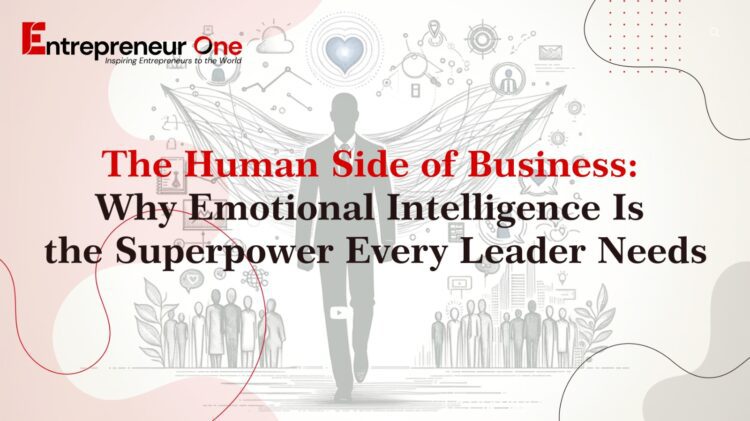More Than Just Brains: Why Smart Leaders Also Need Heart
For a long time, people believed that being successful in business meant being the smartest person in the room. But now, things are changing. Today’s most admired leaders don’t just have sharp minds—they have something else too: emotional intelligence.
Emotional intelligence (or EQ) means being able to understand your own emotions and other people’s emotions too. It’s about staying calm under pressure, listening to others, handling conflict well, and being kind without being soft. And in today’s fast-changing business world, that kind of skill is more important than ever.
Why Being Emotionally Smart Really Works
Let’s talk numbers for a second. A study by TalentSmart found that people with high EQ perform better 58% of the time. Another report from Harvard Business Review shows that leaders with strong emotional intelligence create more profitable companies with happier teams.
So what does this tell us? Simple: People want to work with—and for—leaders who make them feel heard, valued, and understood.
What Emotional Intelligence Looks Like in Real Life
Let’s make this real. Imagine your team just missed a big deadline. A low-EQ manager might lose their temper, blame everyone, or create fear. But a high-EQ manager would first take a breath, understand what went wrong, ask for ideas to fix it, and support the team to bounce back stronger.
Here are a few signs of emotionally intelligent leaders:
- They stay calm even in tough situations.
- They listen more than they speak.
- They give feedback in a helpful way.
- They understand emotions—their own and others’.
- They motivate people, not just manage them.
Gen Z and Millennials Want Empathy at Work
Young professionals today—especially Gen Z and Millennials—care deeply about emotional intelligence. For them, work isn’t just about a paycheck. It’s about mental well-being, feeling respected, and working in a healthy culture.
A recent LinkedIn report said that 78% of young employees would leave a job if their boss didn’t show empathy. That’s huge. And it means that leaders who understand emotions have a better chance of building strong, loyal teams.
If companies want to attract and keep top talent, they need to train their leaders not just in business skills—but in people skills.
A Real Example: How Satya Nadella Changed Microsoft
Let’s look at someone who used emotional intelligence to lead a business transformation: Satya Nadella, the CEO of Microsoft.
When he became CEO in 2014, Microsoft was struggling. People inside the company were competing instead of working together. Innovation had slowed down. What did Satya do? He didn’t start by changing products. He started by changing the company culture.
He told employees to be more empathetic—to customers, to each other, and even to themselves. He encouraged learning, curiosity, and kindness. And guess what? Microsoft’s value jumped from $300 billion to over $2 trillion. That’s the power of leading with emotional intelligence.
Soft Skills Are Now Power Skills
In many workplaces, things like empathy, listening, and kindness used to be called “soft skills.” But now, those are being called power skills—because they help teams perform better, solve problems faster, and stay together longer.
That’s why more and more companies are creating new roles like:
- Chief People Officer.
- Head of Employee Experience
- Director of Well-being
These jobs focus on how people feel at work and how leaders can support their teams in real, meaningful ways.
Can You Learn Emotional Intelligence? Yes, You Can.
The good news is that emotional intelligence isn’t something you’re just born with. It’s a skill, and like any skill, you can learn and improve it with practice. Here are three simple ways to start:
-
1. Notice your emotions. Take a pause before reacting—ask yourself, “Why am I feeling this way?”
2. Listen carefully. Don’t interrupt. Try to understand what others are really saying.
3. Ask for feedback. Find out how your actions affect others, and be open to learning from it.
Over time, these small habits can lead to big growth in your leadership style.
India’s Work Culture Is Changing Too
In India, work culture is evolving fast. Young workers expect more than just good salaries—they want open conversations, work-life balance, and leaders who understand them. This is where emotional intelligence becomes a game-changer.
Some Indian companies, like Infosys and Biocon, are now training managers to lead with empathy, run mindful meetings, and build stronger connections with their teams. Because when people feel emotionally safe at work, they don’t just survive—they thrive.
Why Emotional Intelligence Matters More Than Ever
In a world full of AI tools, smart algorithms, and automation, one thing still sets us apart from machines—our emotions. Our ability to connect, understand, comfort, and inspire is what makes us human. And that’s exactly what business needs today.
Emotional intelligence helps leaders:
- Deal with change better
- Build trust during tough times
- Encourage new ideas without fear
- Create workplaces where people feel proud to belong
Final Thought: Your Biggest Advantage Might Be Your Empathy
At the end of the day, business is about people—customers, employees, investors, and partners. And people don’t just follow smart leaders. They follow leaders who care.
So, whether you’re an entrepreneur, a manager, or a student dreaming big, remember this: how you treat people matters just as much as your ideas. Emotional intelligence isn’t a soft extra—it’s your leadership superpower.
And the best part? You already have it. You just need to use it.














